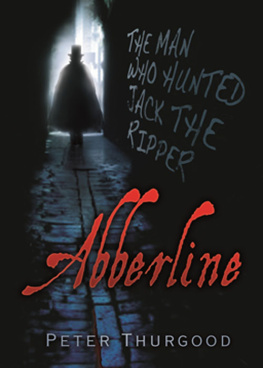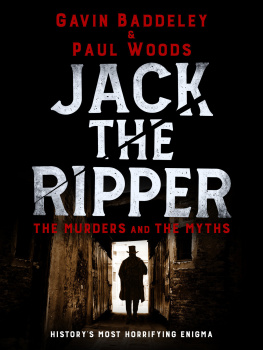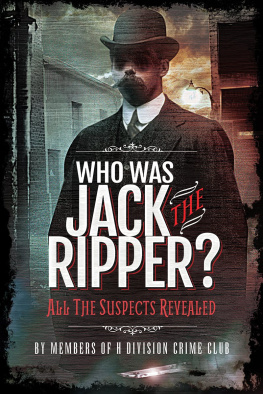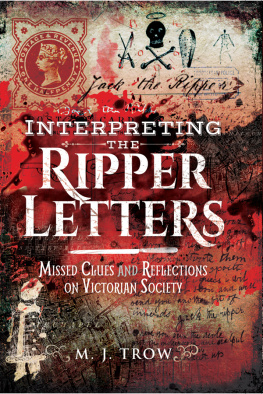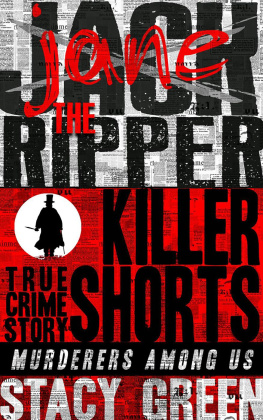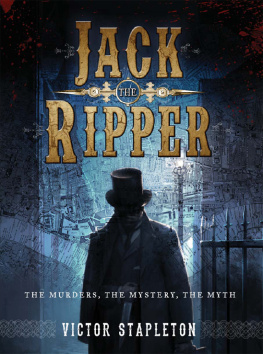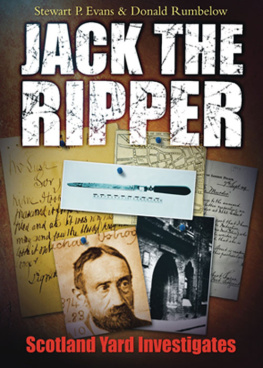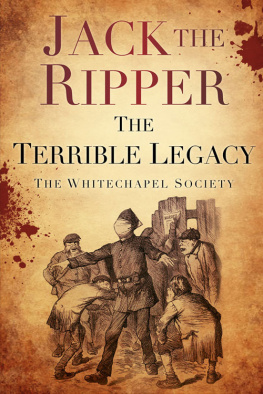Contents
T he name Frederick George Abberline, later to become Detective Inspector Abberline, has become synonymous with the Whitechapel murders, particularly those attributed to Jack the Ripper.
Indeed, the murders have been shrouded by controversy from day one. We have been led to believe that Jacks reign of terror spread like wildfire through the streets of London; that the population were too scared to leave their houses at night. The Star newspaper wrote an editorial in September 1888, stating the following:
London lies today under the spell of a great terror. A nameless reprobate half beast, half man is at large. The ghoul-like creature who stalks through the streets of London, staking [sic] down his victim like a Pawnee Indian, is simply drunk with blood and he will have more.
At the time of The Stars editorial being published, the second murder attributed to the Ripper had only just taken place, and considering that murders were not exactly scarce in London at this time, these two did not score as being very significant to Londons crime figures, apart from the fact of their ferociousness. We need to bear in mind here that this ghoul-like creature who was said to be stalking the streets of London and casting his spell of terror upon ordinary Londoners had, in fact, only been in existence for just over one week.
The press at this time intimated that women were not safe in the streets, that people were hiding in their homes, too afraid to venture out after dark, and that bodies were being found scattered throughout the streets of London. The truth, however, was much simpler; two women had been murdered in the Whitechapel area of London, thus causing some panic, if any, in that area alone, and certainly not causing people to lock themselves in their homes.
From 31 August 1888, when the first victim, Mary Ann Polly Nichols, was discovered, to 9 November that same year, when the body of Marie Jeanette Kelly was found in her room, a total of just five Ripper murders had taken place, over a period of ten weeks. All five Ripper victims were mutilated and dispatched with a grizzly precision, their throats slit and their entrails removed and displayed, almost in a sacrificial manner by someone with what has since been described as a considerable amount of anatomical knowledge.
If we are to believe this more reasoned version of the series of events that became known as the Jack the Ripper murders, then we must also discount the sensationalist reports of the press at the time, who much like their counterparts of today, would do almost anything to sell their newspapers. Their reports of a crazed madman terrorising a whole city and haphazardly butchering women on the streets is pure sensationalism carried out by journalists in order to make money.
Within hours of the first murder, letters started pouring into the press offices, and by the time of the last murder, more than 250 of them had arrived in the in-trays of the popular press, and all purporting to have come from the killer. It was in a letter received by the Central News Agency on 27 September 1888 that the name Jack the Ripper was first used. This letter was originally believed to be just another hoax, but three days later, the double murders of Stride and Eddowes made the police reconsider, especially once they learned a portion of Eddowes earlobe was found cut off from the body, eerily reminiscent of a promise made within the letter. The police deemed the Dear Boss letter important enough to reproduce in newspapers and post-bills of the time, hoping someone would recognise the handwriting.
The image that was being popularised by the press was one of a blood-thirsty killer stalking women at random through the dimly lit streets of the East End, before ripping them to pieces for no apparent reason other than to satisfy his blood lust. From the letters that arrived on the editors desks, however, it is clear that although a few of them must have come from isolated cranks intent on generating a lurid terror in those that read them, many more were written by genuinely concerned members of the public. The character of Jack the Ripper nevertheless remains a paradox. His letters purport to come from a rough-and-ready working-class man who had learned his writing skills in a national school, but their contents are cleverly headline-seeking, and the astuteness with which they were targeted, suggest that the senders came from a different stratum of society. As George R. Sims, the successful author and playwright, wrote in The Sunday Referee newspaper, in October 1888:
How many among you, my dear readers, would have hit upon the idea of The Central News as a receptacle for your confidence? You might have sent your joke to the Telegraph, The Times, any morning or evening paper, but I will lay long odds that it would never have occurred to you to communicate with a Press agency. Curious, is it not, that this maniac makes his communication to an agency which serves the entire press?
Sims was by no means alone in suspecting that the authors of many of the letters, certainly of those purporting to come from the Ripper himself, were in all probability educated and worldly men who were fostering a reign of terror to underline their own political agenda.
From the first body found, there were rumours that the highest in the land were involved in the killings. As The Star wrote in November 1888:
We have heard the wildest stories it is believed by people who pass among their neighbours as sensible folk that the Government do not want the murderer to be convicted, that they are interested in concealing his identity.
Could this be true? Inspector Abberline certainly didnt think so. He was appointed to the case on 1 September 1888, which was the day after Polly Nichols disembowelled body had been found on 31 August 1888 lying on the ground in front of a gated stable entrance in Bucks Row, Whitechapel.
Abberline worked on the Ripper case during its entirety, though unfortunately never procuring a conviction. It is this case that people know him for, but during the course of his career he did head up other investigations that resulted in much better outcomes than the Ripper case did.


1
J uly 1889 was one of the hottest Julys on record. Office staff at the City of London Police headquarters at 26 Old Jewry had been given special dispensation, allowing them to work in their shirt sleeves; probably a first for this period in time, but not something carried forward to uniformed police officers. Even though Sir James Fraser was the Commissioner of the City of London Police, he did not receive any different treatment on this particular ruling than his uniformed officers. Sir James wasnt an easy man to get on with at the best of times: an ex-military man who was used to issuing commands and having them obeyed without question, something that didnt quite work in the same way in the city police force. He was also used to having his every comfort taken care of by his own personal batman; again, something sorely missing in his new post.
It came then as no surprise to his subordinates when he went absolutely berserk, after opening a letter addressed personally to him from Scotland Yard telling him to deal with a case regarding a series of alleged thefts from the London Central Telegraph Office, in St Martins le Grand. Who the hell do these people think they are dealing with? he bellowed. This is nothing more than a case of petty theft, I am the Commissioner, God damn it. He threw the letter across the room to the sergeant who had just delivered it, and told him to deal with it. The sergeant had seen Sir James in one of his moods before on several occasions, and knew instinctively when not to say anything; he just scooped the letter up, mumbled a brief yes sir and left the room.

